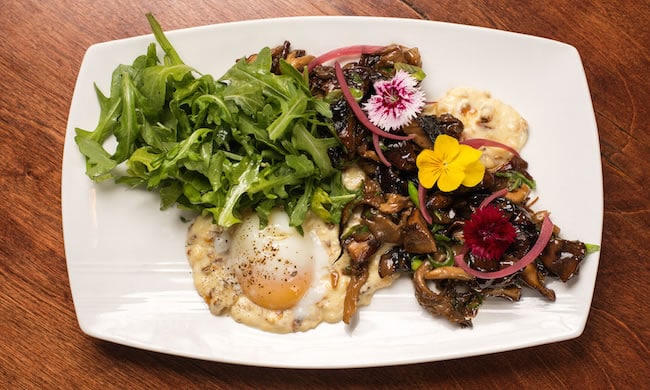Southern New Zealand’s Wanaka is a “quaint little town that never touches the ground,” according to Sean Sanders, who visited when honeymooning with his wife. “It’s a bit below sea level, so the mountains are covered in snow but the ground isn’t. It’s kind of surreal.” The town’s beloved body of water, Lake Wanaka, is also home to schools of brown trout, a highly sustainable fish that Sanders and his wife caught while out on the pristine water.
“We took it back to our cottage to cook it up, and the owner said, ‘please take whatever you want from the land for the meal,’” he recalls. “That experience inspired and enlightened me. New Zealand was just this mecca of things that all come from the land, which made me realize that here, we’ve gotten very far away from our food system and what food actually is.” Sanders reached such levels of clarity that he, a working chef in Chicago who had spent time at several of city’s fine dining establishments, wrote a business plan for a new sustainable eating concept on the plane ride home. He saw potential restaurant spaces when he and his wife returned stateside, and within three-and-a-half weeks, they had found their restaurant—to be dubbed Browntrout—and signed their letter of intent.
The space on the north side of Chicago opened in May 2009, and today offers food inspired by the sustainability Sanders saw in New Zealand, with as much of it sourced locally as possible (about 60% of the produce comes from the area) and a guarantee that all the animals served were treated well. “We’re the only restaurant in the area that I know of that uses a Freedom Ranger, which is a heritage chicken that isn’t a Cornish Cross, which is a breed that’s a mix of all of the types of chickens together,” he says. “The Freedom Rangers take two weeks longer to grow to fruition, and they’re really special and so delicious.” He notes that because the bird is so delectable, his current favorite dish on the Browntrout menu is the chicken liver pate— served with pickled cranberries, bread and butter pickles, golden raisin mustard, and a potato roll.

Maple vanilla panna cotta with peach preserves, pecan crumble, featuring maple syrup from Spence Farm, dairy from Kilgus Farmstead, pecans from Three Sisters Farm, and peaches from Seedling Farms
Atop the restaurant sits a 1,200-square-foot garden consisting of 10,000 pounds of soil on 11 beds that house lemon grass, sage, parsley, thyme, rosemary, chervil, arugula, romaine, peppers, eucalyptus, and more. A wood-fire grill means everything used to heat the food comes from the ground with no gas required, plus, as Sanders says, “we can control the heat, and we have a smoker so we do our own bacon.”
The space housed a Mexican restaurant prior to Sanders’ purchase of the location, so for Browntrout’s takeover, he took sustainability into account as much as possible, with PLA plastic lights lined with fern leaves, hand-driers in the restrooms to eliminate paper towel usage, all green to-go containers, garbage bags made of cornstarch, and food compost from the restaurant feeding about half of the rooftop garden space.
“Eating local would start to kill Chicago’s debt and the national debt, but everyone wants everything cheap,” he says. “It has to happen as a whole. If people are going to buy Monsanto corn, they’re going to buy it. If they’re going to buy organic corn, they’re going to buy it, but they’ll buy less of it because it’s expensive. It’s just human nature.”

